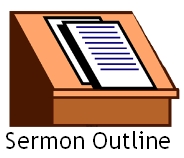Lesson: John 14.6-14
Sermon Title: Blessed Assurance
I made a promise that I could guarantee that all your prayers could be answered. Is this possible? I have sufficient faith to believe that it is possible. Come and see!
INTRODUCTION:
The Lottery
Lefkowitz was a very pious old man, who had lived his life according to the Commandments, never asking anything, always giving to others. Finally, wanting to have something for himself, and to experience the other side of life, he began to pray to God.
“Lord”, he said, “All my life I have tried to be good, to follow all your Laws and Commandments, and to always help others, never asking anything for myself when I have prayed to you. Now that I am old, I am finally asking for something for myself. All that I want is to win the Lottery, so I can have a comfortable old age.”
For year after year, he repeated this prayer, and nothing would happen. Finally, in despair, he again prayed to God, saying “Why have you abandoned me? Is this all I am to have in life? All I have ever asked you for is to just once to win the Lottery. What have I done wrong that you punish me this way?”
And an aggravated voice boomed down from the heavens, saying, in exasperation, “Lefkowitz, BUY A TICKET ALREADY!!!”
Is this a request that can be fulfilled?
Probably not.
I walked in to an adult fellowship activity to overhear two men talking about the Reader’s Digest Sweepstakes.
I said you don’t have to enter, I prayed and God told me that I was going to win the Sweepstakes.
He did replied one man, taking my statement seriously.
I have to stop and explain that I was only having a bit of fun.
God is not in the business of declaring sweepstakes winners.
The precis reads: “I made a promise that I could guarantee that all your prayers could be answered. Is this possible? I have sufficient faith to believe that it is possible. Come and see!”
MAIN BODY:
How can one guarantee that all one’s prayers can be answered?
What does Jesus say?
John 14.13 I will do whatever you ask in my name, so that the Father may be glorified in the Son.
John 14.14 If in my name you ask me for anything, I will do it.
John 15.16 You did not choose me but I chose you. And I appointed you to go and bear fruit, fruit that will last, so that the Father will give you whatever you ask him in my name.
John 16.23 On that day you will ask nothing of me. Very truly, I tell you, if you ask anything of the Father in my name, he will give it to you.
John 16.24 Until now you have not asked for anything in my name. Ask and you will receive, so that your joy may be complete.
What’s in a name?
Name is not a magic word like “Open Sesame.”
H. William Gregory, writes in And The Answer Is Yes!
“Prayer is not a magic lamp. It is not something we can hold in our hands and fondle, calling forth some genie in the sky to make our wishes come true and produce for us whatever the deepest desires of our hearts might be. That is not an adequate model for prayer. Neither is prayer a letter to Santa Claus – somewhat like the genie but more contemporary, perhaps. I suggest that John Baillie’s definition of prayer is more appropriate: ‘Prayer is thinking towards God.’ God is not a coin machine into which we put a 10-cent prayer to receive a candy bar. There is no suggestion that, in thinking toward God, our wishes will be granted, although in some mysterious and strange way when we find ourselves in tune with God, those things we think about and pray for seem to happen.”
God is not like a Santa Claus
God is not a vending machine.
Leanne Ciampa, Sermon in Thanksgiving Sunday, 1992, Middletown, Ohio. Writes:
Pastor Leanne Ciampa calls certain kinds of people “911 Christians.” Whenever things get rough, whenever their life is “in crisis,” they do something unnatural and unusual: They turn to God for help and guidance, and dial “911 God.”
The question about prayer, and especially answered prayer is a question that Olive Ann Burns attempted to address in Cold Sassy Tree.
The story has its roots in the experiences of Burn’s parents and relatives.
She wrote it while recovering from the treatment for cancer.
She said, “for something more exciting to think about than fever and chemotherapy.
At one point Will Tweedy, Grandpa Blakeslee’s grandson, raises the question of why Jesus said that we could ask God for anything we want and get it.
Grandpa Blakeslee responds, “Maybe Jesus was talkin’ in His sleep, son, or folks heard Him wrong.” But then he goes on to add: “All I know is thet folks pray for food and still go hungry, and Adam and Eve ain’t in thet garden a-theirs no more, and yore granny ain’t in hers, and I ain’t got no son a-my own to carry on the name and hep me run the store when I’m old. Like you say, you don’t git thangs jest by astin’. Well, I’m a-go’n study on this some more. Jesus must a meant something else, not what it sounds like.”
When Jesus said, “Ask and you shall receive,” it doesn’t mean for us to pray for rain:
“Faith ain’t no magic wand or money-back gar’ntee, either one. Hit’s jest a way a-livin’ … Hit means you do’n be holdin’ on to God in good or bad times, and you accept whatever happens. Hit means you respect life like it is – like God made it – even when it ain’t what you’d order from the wholesale house…. When Jesus said ast and you’ll git it, He was givin’ a gar’ntee a-spiritual healin”, not body healin’. He was sayin’ thet if’n you git beat down – scairt to death you cain’t do what you got to, or scairt you go’n die, or scairt folks won’t like you – why, all you got to do is put yore hand in God’s and He’ll lift you up…. I found out long time ago, when I look on what I got to stand as a dang hardship or a burden, it seems too heavy to carry. But when I look on the same dang thang” as a challenge, why, standin’ it or acceptin’ it is like you done entered a contest. Hit even gits excitin’, waitin’ to see how everythang’s go’n turn out.”
Then Grandpa sums up his views:
“Jesus meant us to ast God to hep us stand the pain, not beg Him to take the pain away. We can ast for comfort and hope and patience and courage, and to be gracious when thangs ain’t goin’ our way, and we’ll git what we ast for. They ain’t no gar’ntee thet we ain’t go’n have no troubles and ain’t go’n die. But shore as frogs croak and cows bellow, God’ll forgive us if’n we ast Him to,” (363-364).
Is she right?
His answers would not be acceptable to the Methodists or the Baptists in Cold Sassy Tree.
This Congregationalist believes that he is right on the money.
What did Jesus pray for?
In the Garden of Gethsemane Jesus prayed:
He said, “Abba, Father, for you all things are possible; remove this cup from me; yet, not what I want, but what you want.” Mark 14:32 through Mark 14:36 (NRSVA)
He accepted the will of God.
Of course, God’s will was also his will.
This is not a NO.
It is acceptance of what is and will be.
Jesus prayer in John 17 is enlightening and informative.
The first 5 verses are his prayer for himself.
Verses 6-19 is Jesus prayer for his disciples.
6″I have made your name known to those whom you gave me from the world. They were yours, and you gave them to me, and they have kept your word. 7Now they know that everything you have given me is from you; 8for the words that you gave to me I have given to them, and they have received them and know in truth that I came from you; and they have believed that you sent me. 9I am asking on their behalf; I am not asking on behalf of the world, but on behalf of those whom you gave me, because they are yours. 10All mine are yours, and yours are mine; and I have been glorified in them. 11And now I am no longer in the world, but they are in the world, and I am coming to you. Holy Father, protect them in your name that you have given me, so that they may be one, as we are one. 12While I was with them, I protected them in your name that you have given me. I guarded them, and not one of them was lost except the one destined to be lost, so that the scripture might be fulfilled. 13But now I am coming to you, and I speak these things in the world so that they may have my joy made complete in themselves. 14I have given them your word, and the world has hated them because they do not belong to the world, just as I do not belong to the world. 15I am not asking you to take them out of the world, but I ask you to protect them from the evil one. 16They do not belong to the world, just as I do not belong to the world. 17Sanctify them in the truth; your word is truth. 18As you have sent me into the world, so I have sent them into the world. 19And for their sakes I sanctify myself, so that they also may be sanctified in truth.
What did the Apostle Paul pray for?
He prayed that his thorn in the flesh, his messenger from Satan might be removed.
Therefore, to keep me from being too elated, a thorn was given me in the flesh, a messenger of Satan to torment me, to keep me from being too elated. 8Three times I appealed to the Lord about this, that it would leave me, 9but he said to me, “My grace is sufficient for you, for power is made perfect in weakness.” So, I will boast all the more gladly of my weaknesses, so that the power of Christ may dwell in me. 10Therefore I am content with weaknesses, insults, hardships, persecutions, and calamities for the sake of Christ; for whenever I am weak, then I am strong, (2 Corinthians 12:7-10, NRSVA).
Again this is not a no.
It is a willingness to live within the revealed will of God.
Paul’s most significant prayer is found in Ephesians 1.
15I have heard of your faith in the Lord Jesus and your love toward all the saints, and for this reason 16I do not cease to give thanks for you as I remember you in my prayers. 17I pray that the God of our Lord Jesus Christ, the Father of glory, may give you a spirit of wisdom and revelation as you come to know him, 18so that, with the eyes of your heart enlightened, you may know what is the hope to which he has called you, what are the riches of his glorious inheritance among the saints, 19and what is the immeasurable greatness of his power for us who believe, according to the working of his great power. Ephesians 1:15 through Ephesians 1:19 (NRSVA)
All of these prayers are within the scope of the name.
This is the scope of the will and purposes of God, and Jesus.
So if we know what to pray for, don’t we also know what not to pray for?
I do not pray to win the lottery.
I do not pray to change the weather.
I do not always pray for physical healing.
In some cdases this is inappropriate.
I always for spiritual strength.
We use the medical and medicinal means that are available.
Pray for the measure of health and strength that you may develop.
I do not pray for safety, but for wisdom and sensitivity to the world in which I live.
God cannot keep us “safe.”
God can help us to live in safety.
That is to have the wisdom and the understanding to reduce the risks, rather than heightening them.
I do not pray for peace, but to be peaceable.
As Ralph Waldo Emerson in Self-Reliance, observed:
Prayer that craves a particular commodity … is vicious. Prayer as a means to effect a private end is meanness and theft …. As soon as man is at one with God, he will not beg. He will then see prayer in all action. The prayer of the farmer kneeling to his field is to weed it.
In Elie Wiesel’s dark but brilliant autobiographical novel Night, he tells of how a rabbi taught him how to pray.
The rabbi explained to him that in every question there is a power beyond the obvious answer. “Man raises himself toward God,” he says “by the questions he asks Him. Man questions and God answers. But we do not understand those answers.”
“I pray to the God within me,” says the Rabbi, “that he will give me the strength to ask Him the right questions.”
The strength to ask the right questions.
The wisdom to know what to pray for.
Sometimes this comes in silence.
The prior of Taize, Brother Roger Schutz, writes about silence in one of his journals:
“Prayer, descending into the depths of God, is not there to make life easy for us. Prayer is not for any kind of result but in order to create with Christ a communion in which we are free. When man strives to give expression to this communion in words, we have conscious prayers. But our understanding can only deal with the outer surfaces of ourselves. Very soon it comes up short … and silence remains, to such an extent as to seem a sign of the absence of God. Instead of coming to a standstill with the barrenness of silence, know that it opens toward unheard-of possibilities of creation; in the underlying world of the human person, in what lies beyond our consciousness, Christ prays more than we can imagine. Compared with the vastness of this secret prayer of Christ in us, our explicit prayer dwindles almost to nothing. Certainly the essence of prayer takes place above all in great silence.”
CONCLUSION
Here is a prayer that may embodie all that I have been attempting to communicate this morning.
It is from Ruth Myers 31 Days of Praise (Sisters, Ore.: Multnomah Books, 1994)
“Father, I thank you for the people in my life who seem to bring more pain than joy, for I believe you have let our paths cross for important reasons. Thank you for the good things you want to do in my life through the things that bother me.
“I’m grateful that you are with me to meet my needs … even when those close to me fail to do so. I’m so glad that you are also within me working to make me more like Jesus — more patient, more gentle, more loving — through the very things I dislike.
“Thank you, too, that you love these people and that your love is adequate to meet their deepest needs and to transform their lives….
“And so, though I may not feel grateful, I give thanks for them by faith …. Thank you that by your power I can receive them as you receive me — just as I am, warts and wrinkles and hang-ups and all …. Help me choose not to judge but to forgive them … to cancel any debts I think they owe me –apologies, obligations …. Through your grace, I choose to wipe clean any slate of grievances I have within me and to view these people with a heart that says, ‘You no longer owe me a thing.’
“Thank you for your Spirit, who empowers me so that I can do them good, delight in you, and commit my way to you, resting in you as you unfold your good purposes in these relationships — in your time. Amen.



